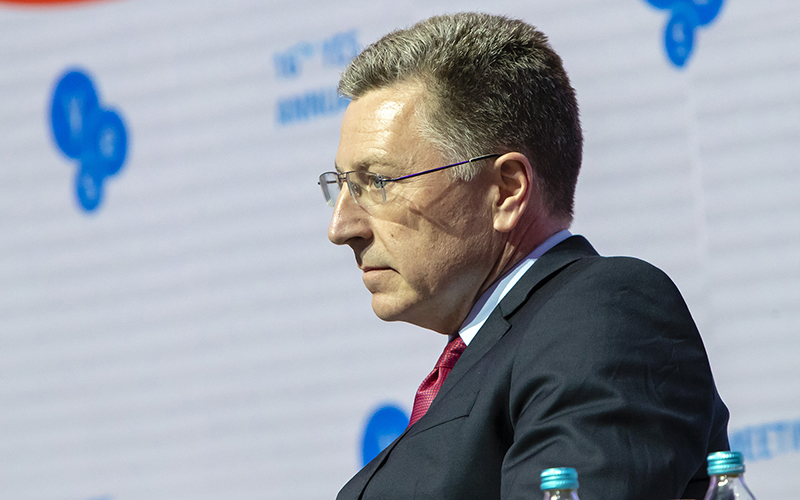WASHINGTON – Kurt Volker is still serving as executive director of the McCain Institute, after resigning as U.S. special envoy for Ukraine when his name surfaced last week in a whistleblower’s report on President Donald Trump’s dealings with that country.
Volker’s resignation, first reported by The State Press at Arizona State University, came after he was identified as an intermediary between Ukranian President Volodymyr Zelensky and former New York Mayor Rudy Giuliani.
Giuliani, acting as Trump’s personal lawyer, was pushing the Ukrainians to investigate former Vice President Joe Biden, a political rival and potential 2020 challenger, and his son, Hunter Biden. That push by the Trump White House is now the focus of an impeachment inquiry by the House.
Volker, who is scheduled to be deposed Thursday by three committees pursuing the impeachment inquiry, has not discussed the reason he resigned from the part-time, unpaid State Department position. He did not respond to a request for comment Monday.
But others at the McCain Institute were quick to defend both Volker and his tenure at the organization.
Jeff Cunningham, a McCain Institute board member and a professor of practice at ASU’s Thunderbird School of Global Management, said he feels honored to work with Volker, whom he called “eminently thoughtful, deeply knowledgeable and absolutely candid, and above all, a very truthful person.”
“This has been a most unusual situation,” Cunningham said. “It appears to be not inconsistent with the way in which the administration works. I can only imagine that Kurt did what his head, his heart, and his conscience suggested he should do.”
The whistleblower’s complaint followed a July 25 phone call in which Trump asks Zelensky to “do us a favor” and open an investigation into Biden. He encourages Zelensky to work with Giuliani and Attorney General William Barr, adding that “if you could speak to him (Giuliani), that would be great.”
The complaint goes on to say that Volker, along with U.S. Ambassador to the European Union Gordon Sondland, advised Ukrainian leadership on how to “‘navigate’ the demands that the President had made of Mr. Zelenskyy.'” It said the two ambassadors had spoken with Giuliani “in an attempt to ‘contain the damage’ to U.S. national security.”
Volker is scheduled to testify Thursday before three House committees handling the impeachment inquiry – the committees on Oversight, Intelligence, and Foreign Affairs. In a letter Friday to Secretary of State Mike Pompeo, the chairs of those committees cited a text message Volker allegedly sent Giuliani to arrange a meeting with Andriy Yermak, a top Zelensky aide. The letter went on to say that Giuliani said he used that meeting to pressure Yermak to pursue the investigations Trump wanted.
Giuliani and Pompeo have also been subpoenaed by the three House committees as part of the impeachment inquiry, which was announced by House Speaker Nancy Pelosi last week following the emergence of the whistleblower complaint.
Cunningham said that, as far as the board members’ knowledge of Volker’s involvement in the whistleblower complaint goes, “most of us really only know what we read” in the news.
A spokesman for the McCain Institute said Volker’s resignation from his role as a U.S. diplomat will allow him to dedicate more time to his job leading the institute.
“He was there to try to help Ukraine be in better shape with the threats to its territory and its democracy, but he never intended to do the volunteer job forever,” said Luke Knittig of Volker’s State Department role. “Now that it’s come to an end, he can really dedicate his full effort to his work with the McCain institute.”
Volker was appointed as the U.S. Special Envoy for Ukraine in August 2017.
“These are very volatile, geopolitically unstable times,” Cunningham added. “And I suspect that this has now crept into the situation that Kurt found himself in.”

